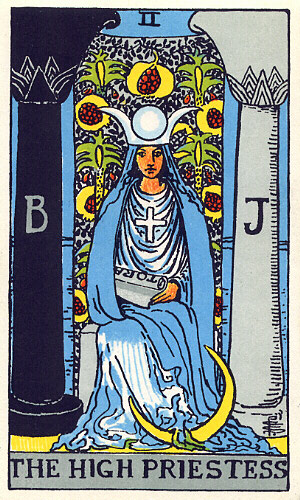
|
"Number 2 is the symbol of duality, the Mother-principle, as separate from the
Father-principle of Number 1,
which is now broken up into its positive and negative elements. Number 2
signifies a pair of opposites: day
and night, male and female, projection and reception. In Key 2, the High
Priestess, or the unconscious, reflects
the consciousness of the Magician, and is the vessel which receives the
creative force and initiates form."
- The Hermetic Order of the Golden Dawn
The Tarot and Numerology
And so we see that, by representing the High Priestess, the song
In the Wake of Poseidon
, is the feminine (kinder gentler) counterpart of the song
The Court of the Crimson King
(which represents the High Priest).
"The High Priestess
is the virgin daughter of the Moon, the eternal feminine, sometimes called
Isis, Artemis or Diana. She
corresponds to all the virgin goddesses of the ancient world, even also to Eve
before her union with Adam. She
is spiritual enlightenment and inner illumination."
- The Hermetic Order of the Golden Dawn
The Tarot and Numerology
|